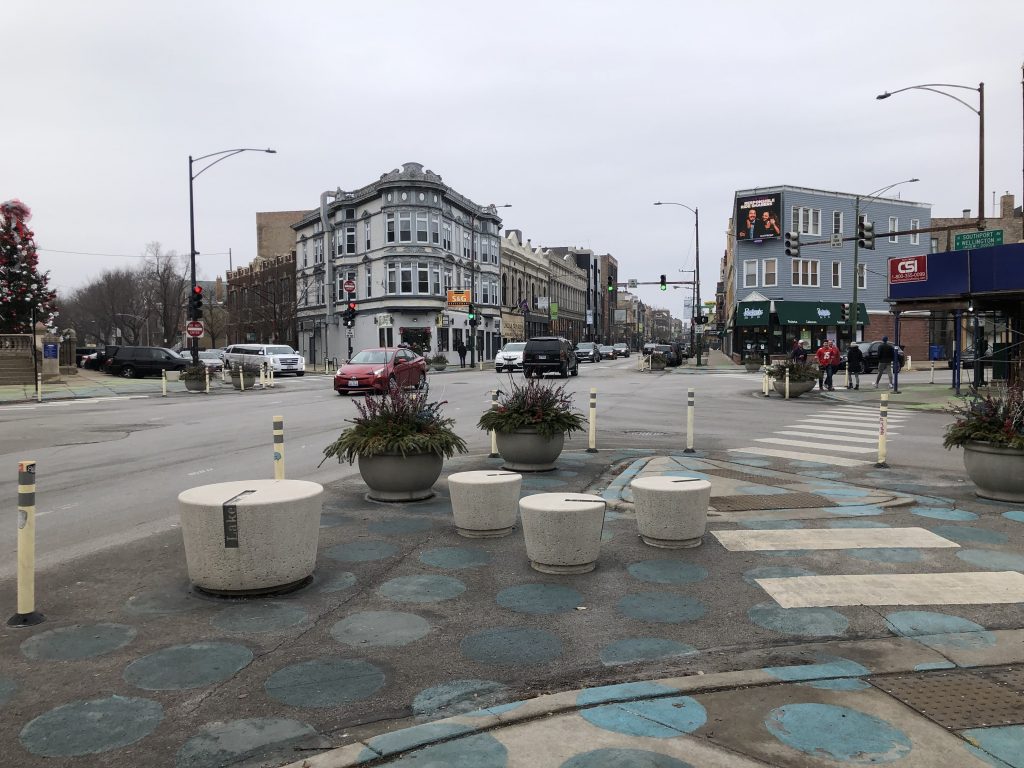Milwaukee Launching New Community Plaza Program
Effort would allow underused streets to be turned into temporary parks.

A plaza created from an excess turn line at N. Southport Ave. and N. Lincoln Ave. in Chicago in 2019. Photo by Jeramey Jannene.
The City of Milwaukee is launching a new public plaza program aimed at allowing community groups to turn underused streets into gathering spaces.
Crafted by the Department of Public Works, the new program extends the city’s pandemic-inspired Active Streets for Businesses effort to a broader audience. Instead of reserving space for extra patron seating, it would create new public spaces.
The program would allow groups, with the use of protective barriers, to convert excess turn lanes, and underused and stub-end streets into community spaces through extended temporary street closures.
The Common Council’s Public Works Committee unanimously endorsed the permitting framework Wednesday. The full council will consider the idea in two weeks.
“We know we have a lot of interest in Alderman Jonathan Brostoff‘s district,” said DPW senior transportation planner Kate Riordan of Riverwest and the East Side. A portion of E. Ivanhoe Pl. is being converted to a plaza through the Active Streets for Business program and other proposals are being studied, like making Brady Street a pedestrian street.
“This is quietly a huge step forward for Milwaukee and is going to have significant and critical implications for the community as a whole,” said Brostoff.
Riordan said DPW expects most of the applicants to be business improvement districts, a self-taxing entity that is focused on improving a specific commercial corridor. “They do take responsibility for that space, so that’s why we expect it to be a more resourced organization,” she said. That responsibility includes securing insurance for the space.
Maintaining a closure through the winter is an option, but the organization would need to commit to a snow removal strategy.
Wisconsin Bike Fed pedestrian program manager Marybeth McGinnis endorsed DPW’s plan. She cited the success of the creation of a pop-up park by closing a southbound turn lane on S. 16th St. onto W. Forest Home Ave. and merging it with an adjacent vacant lot. Muskego Way Forward is the lead organization on the pop-up park and the Bike Fed served as a partner.
Interested organizations should reach out to DPW (plazas@milwaukee.gov) to inquire about suitable streets. “Obviously there are places where this doesn’t make sense,” said Riordan.
Brostoff praised Mayor Cavalier Johnson‘s commitment to safe streets and combating reckless driving as a guiding force for the change. “This wouldn’t be happening if not for the direction he gave to the administration,” said the newly-elected alderman. “I was all ready to push really hard on all sorts of stuff, but it’s like pushing against a marshmallow. Everyone is going the same direction.”
The program would initially launch without any fees for its annual permits. DPW could revoke a permit for noncompliance with the program guidelines. Applicants are responsible for the costs of complying with the guidelines, including insurance and procuring the barriers.
The program, formally the Interim Plaza Program, was proposed as a result of the Gathering Places Feasibility Study and is part of a five-year (2022-2027) outdoor recreation plan the city is following to guide rehabilitation and enhancement of its outdoor places, including parks.
Once approved, DPW will launch a website with full instructions at milwaukee.gov/InterimPlazas. A copy of the proposed guidelines is available on Urban Milwaukee.
If you think stories like this are important, become a member of Urban Milwaukee and help support real, independent journalism. Plus you get some cool added benefits.
City Hall
-
Council Blocked In Fight To Oversee Top City Officials
 Dec 16th, 2025 by Jeramey Jannene
Dec 16th, 2025 by Jeramey Jannene
-
Latest Effort to Adopt New Milwaukee Flag Going Nowhere
 Dec 3rd, 2025 by Jeramey Jannene
Dec 3rd, 2025 by Jeramey Jannene
-
After Deadly May Fire, Milwaukee Adds New Safety Requirements
 Dec 2nd, 2025 by Jeramey Jannene
Dec 2nd, 2025 by Jeramey Jannene





















Yes, yes, and yes again. Consideration should include residential neighborhoods – the city grid system has been with us over 100 years, but people live and play in our neighborhoods and not every street needs to be a shortcut for non-locals to zoom through. A few thoughtful street closures would creat neighborhood culdesacs and enhance a sense of community and provide safe-zones for play.